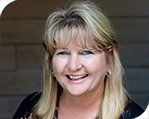 Sue Botelho, a nationally recognized mortgage planning and program guideline expert, is the sales manager and senior loan consultant for the Ft. Walton Beach, Panama City, Crestview, and Niceville offices of Waterstone Mortgage Corp.
Sue Botelho, a nationally recognized mortgage planning and program guideline expert, is the sales manager and senior loan consultant for the Ft. Walton Beach, Panama City, Crestview, and Niceville offices of Waterstone Mortgage Corp.
A veteran of the industry since 1998, Sue began her career as a loan processor and underwriter. Having won awards for her abilities, Ms. Botelho has been interviewed by the Wall Street Journal and Good Morning America. Prior to entering the industry, Sue worked for a builder-developer for 15 years.
Sue has built a 100% referral-based business by leveraging relationships with past clients, realtor referral partners, financial advisors, accountants, attorneys and title companies.
In our interview, Sue shares her insights on the critical success factors to serve clients and excel in the mortgage industry.
Jeremy: Hi Sue, thank you for offering to share your insights on the mortgage industry. Can you share with our readers how you first got in the industry?
Sue: It was out of necessity. I was working for a builder and I ended up losing my job after fifteen years. I went to a friend of mine who owned a mortgage business and he hired me as a processing assistant. That was in 1998.
Jeremy: As a top producer in the industry, did you find a lot of challenges initially or did it come pretty naturally?
Sue: It kind of came pretty natural. They gave us the ability to take a lot of MBA classes. They were a very big company. So I was able to kind of absorb just from what was going all around me. And took a bunch of classes, read everything I could. Moved up from processing assistant to processor. Then went from there to an underwriter and from there I became a loan officer.
Jeremy: And what time of clients do you typically help? Is there a particular profile?
Sue: It depends on what year it was. When I first started out I worked in an office in a resort area that mostly did second home and investment property, condos, and single family. And in 2008, I realized condos are going the way of the “duck-billed platypus”. So I had to reinvent myself and I reinvented myself doing USDA loans at that time. Our area, as crazy as it sounds, is a resort area but it also qualifies as rural for the USDA program in many pockets.
So I kind of got into doing that. And that kind of transformed into a lot of FHA and VA. We have four large bases very close to us, one of which is the largest in the country. And so now it’s kind of a big mix. I do a lot of condos. Taking on investments still or again I should say. And VA is probably my biggest — VA and condos.
Jeremy: Interesting.
Sue: Kind of a crazy mix.
Jeremy: Yes, definitely. And what sort of unique challenges do you think that consumers face and how do you help them with those challenges?
Sue: A gentleman I worked for use to tell me that I was able to operate in the grey. I was never black and white. I think my job is to delve deeper and ask more questions than most people do and, because of that, I get a lot of people that other people can’t approve or don’t take the time to try to approve. And we’re able to make them work. I’m really good with self-employed files, reading tax returns.
And I can certainly find income that a lot of other loan officers can’t even if they had taken the file and gotten it all the way to an underwriter that may have been able to find the necessary income.
So we do a lot files that other people can’t. A lot. We get a lot of turn-downs from other people and that in turn gets us a big referral base. We have had literally dozens of people cry because we get them approved.
Jeremy: I can imagine.
Sue: It’s not necessarily our focus, but that’s how we get a lot of business. Even our realtor referrals, because they have a lot of turn downs or they have somebody that got turned down at a lot of different places and then we’re able to get it done and then they bring us their good stuff, too.
We certainly don’t want to be known as the people that only did bad stuff, the hard ones. But that’s how we get a lot of our referral clients. Our referral partners often come from being able to approve those clients that other people couldn’t approve.
Jeremy: Actually, I remember back when I had my own mortgage company and one loan, it was a 1.5 million dollar loan. But it was a one bedroom loft in San Francisco in an industrial area. And because the owner also used his home for his business, and had a ton of write offs, we had to do a stated income loan.
Sue: Right.
Jeremy: He grossed over two million a year, but he only showed something like $80,000. So that was a tough loan to get approved.
Sue: And if you’re able to get those approved, those people that sent them to you are definitely appreciative. And they remember that.
Jeremy: Yes exactly.
Now how important do you feel trust and credibility are to your prospective clients and how do you communicate that?
Sue: Credibility obviously is huge. I’ve got one person I’m working with right now, a woman that’s doing a 1031 exchange. She had some very serious questions about it. I get answers for people, and even if I know the answer, I verify.

